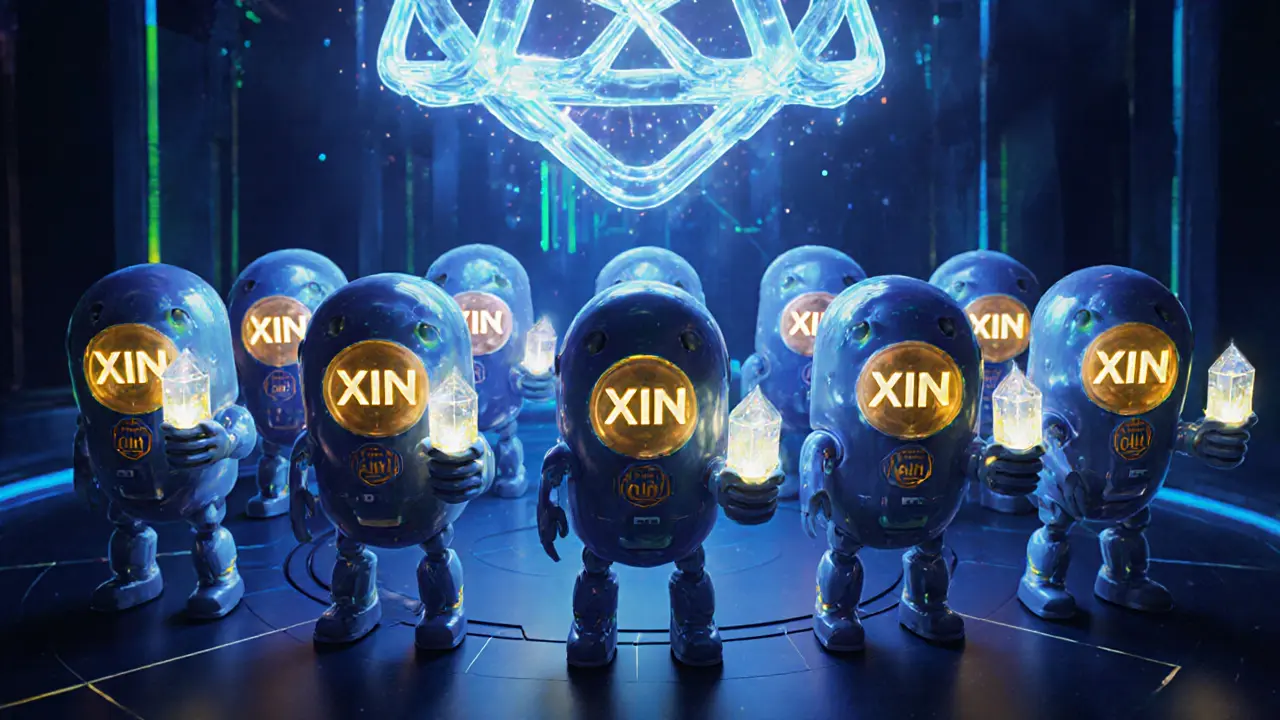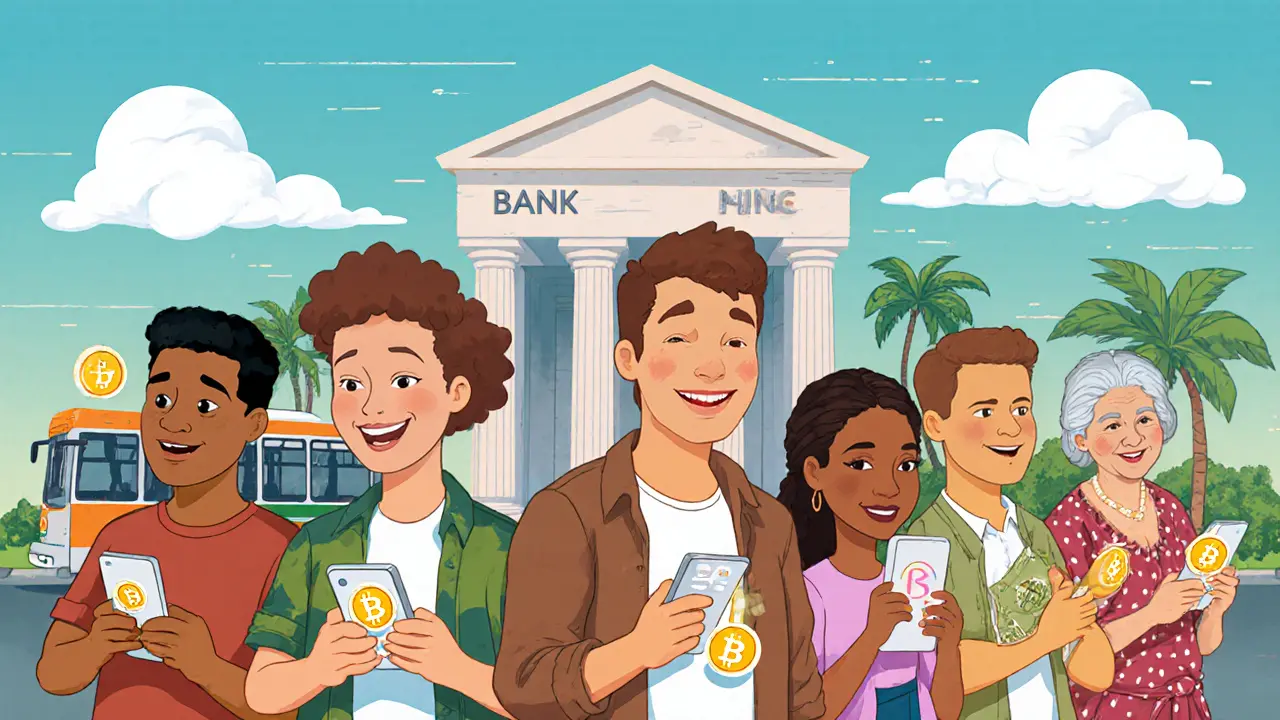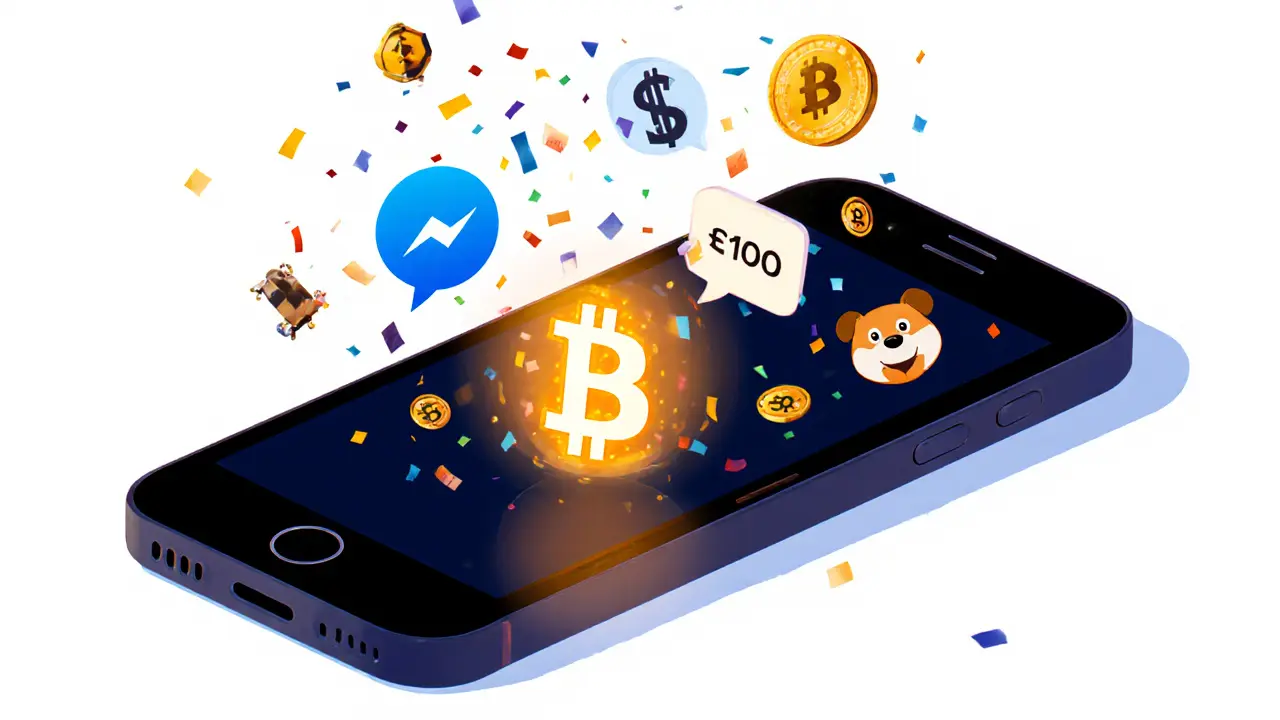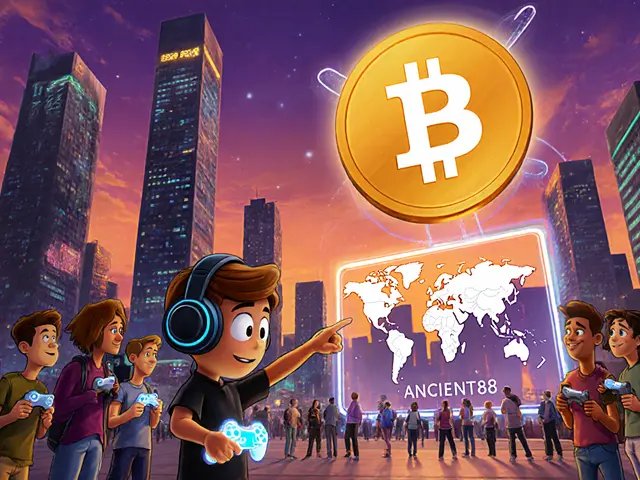Mixin Cross-Chain Transfer Cost Calculator
Compare Your Transfer
Mixin (XIN) isn't just another cryptocurrency. It’s a hybrid system that blends a fast, private blockchain with a messaging app designed to send crypto like a text message. If you’ve ever struggled with copying long wallet addresses or waiting minutes for a Bitcoin transfer, Mixin offers a different approach - one that works on phone numbers, not public keys.
What Is Mixin Network?
Mixin Network is a decentralized protocol built to move digital assets across different blockchains - Bitcoin, Ethereum, Solana, and more - without needing bridges or wrapped tokens. Unlike most networks that rely on smart contracts, Mixin uses a Directed Acyclic Graph (DAG) structure combined with Byzantine Fault-Tolerant (BFT) consensus. This lets it process transactions in under a second, with zero fees, and handle up to 50,000 trading pairs simultaneously.
The network isn’t just code. It’s tied to Mixin Messenger, a mobile app that lets you send crypto using just a phone number. No wallet addresses. No QR codes. You type a number, pick an asset, and hit send. It’s as simple as sending a message on WhatsApp - but with real Bitcoin, Ethereum, or Dogecoin on the other end.
The XIN Token: How It Works
XIN is the native token of the Mixin Network. It’s not mined. It’s not staked. It’s fixed: only 1,000,000 XIN tokens exist, forever. All of them were created at launch in 2019. Here’s how they’re distributed:
- 400,000 XIN - Listed on exchanges (mostly BigONE as XIN/EOS)
- 500,000 XIN - Reserved for network nodes (50 kernel nodes, each holding 10,000 XIN as collateral)
- 50,000 XIN - Given to the core development team
- 50,000 XIN - For early users, campaigns, and whitelist programs
Every time you pay a fee on the Mixin platform - whether sending crypto or using a feature - that fee gets burned. That means the total supply of XIN slowly decreases over time, theoretically increasing scarcity. But here’s the catch: most of the supply is locked in just 50 nodes. That’s a big red flag for decentralization.
How Mixin’s Privacy Tech Works
Mixin doesn’t just move crypto fast - it hides it. It uses Bitcoin’s UTXO model (like how Bitcoin tracks unspent outputs) but layers on CryptoNote’s one-time key technology. This creates something called "ghost outputs." When you send XIN, the system generates a temporary, one-time address that disappears after the transaction. No one can trace where your coins came from or where they went.
It also uses Multi-Party Computation (MPC) for wallet security. Instead of one private key sitting on your phone, your keys are split across multiple servers. Even if one server gets hacked, your funds stay safe. Mixin calls this "Mixin Safe," and it’s one of the few systems that actually delivers on decentralized custody without requiring you to manage seed phrases.

Mixin Messenger: The Real Killer Feature
The real reason people use Mixin isn’t the blockchain. It’s the app. Mixin Messenger works like Telegram or WhatsApp - but built for crypto. You sign up with your phone number. You add Bitcoin, Ethereum, or any of 50,000+ tokenized assets. Then you send them to anyone in your contacts - no wallet address needed.
Users report completing their first transfer in under 10 minutes. One Reddit user said: "I sent Bitcoin to my friend in 15 seconds. He didn’t even know what a wallet was. He just got it like a text." That’s the magic.
But it’s not perfect. Customer support response times average 72 hours. The app doesn’t have a web version. And while the encryption is end-to-end, the company still controls the servers. That’s a trade-off for simplicity.
How Mixin Compares to the Competition
Mixin isn’t trying to be Ethereum. It’s not building DeFi apps or NFT marketplaces. It’s focused on one thing: making cross-chain transfers invisible to the user.
| Feature | Mixin | Chainlink | Polkadot |
|---|---|---|---|
| Primary Goal | Fast, private, cross-chain messaging | Smart contract data feeds | Interoperability between blockchains |
| Transaction Speed | 0.8 seconds | 15+ seconds | 6 seconds |
| Transaction Fees | Zero (fees burned) | Gas fees | Gas fees |
| Privacy | High (ghost outputs) | None | Low |
| Wallet Interface | Phone number only | Wallet addresses | Wallet addresses |
| Node Count | Exactly 50 | 1,000+ | 1,000+ |
Mixin wins on speed and simplicity. But it loses on decentralization. Chainlink and Polkadot have thousands of nodes. Mixin has 50. Each one needs to lock up 10,000 XIN - meaning just 50 entities control the entire network. That’s not just centralized - it’s fragile. If even a few of those nodes go offline, the whole system slows down.
Why the XIN Price Crashed
Mixin’s token hit an all-time high of $2,387.60 in March 2024. By June 2025, it had lost 95.73% of that value. Why?
- Concentrated supply: 500,000 XIN (50%) is locked in 50 nodes. That’s a massive sell risk if any node operator cashes out.
- Low trading volume: Only 16 exchanges list XIN. Compare that to Chainlink on 85+.
- No real DeFi ecosystem: You can’t lend, borrow, or stake XIN in any major protocol.
- Marketing failure: Most people don’t know Mixin exists. Telegram has 800 million users. Mixin Messenger has 1.2 million.
Investors bought XIN hoping it would become the "Bitcoin of messaging." But without adoption, the token has no utility beyond speculation. As one trader put it on TradingView: "The network works great. The token? It’s a gamble."

Is Mixin Safe to Use?
If you just want to send crypto fast and privately - yes. Mixin Messenger is one of the easiest ways to move Bitcoin or Ethereum without dealing with wallets or gas fees. The tech is solid. The encryption is strong. The MPC custody model is ahead of most apps.
But if you’re buying XIN as an investment? Proceed with extreme caution. The token’s value isn’t tied to usage. It’s tied to speculation. And with 50% of the supply locked in just 50 wallets, a single move could crash the price again.
Also, regulatory risk is rising. ESMA flagged Mixin in early 2025 as a "technology requiring enhanced scrutiny" because it moves assets across borders without KYC. That could mean future restrictions.
What’s Next for Mixin?
The team is pushing hard. The v2.0 upgrade in October 2025 cut confirmation times to 0.8 seconds. They’re adding Solana integration in Q1 2026 and building a decentralized identity system for Q3 2026. If they can make Mixin Messenger the default way people send crypto on mobile - especially in regions with low banking access - they might pull off a real win.
But right now, it’s a niche tool for crypto-savvy users. Not a mainstream product. The tech is impressive. The team is smart. But without solving the adoption problem, Mixin will stay on the fringes.
Is Mixin (XIN) a good investment?
Probably not for most people. The XIN token has no real DeFi ecosystem, very low trading volume, and 50% of its supply is held by just 50 nodes. The network itself is technically strong, but the token’s value is driven almost entirely by speculation. If you believe in the messenger app’s future, you might hold a small amount - but don’t invest more than you can afford to lose.
Can I send Bitcoin through Mixin Messenger?
Yes. Mixin Messenger lets you send Bitcoin, Ethereum, Solana, Dogecoin, and over 50,000 other tokenized assets using just a phone number. You don’t need to know wallet addresses or deal with gas fees. It’s one of the few apps that makes crypto feel as simple as texting.
How is Mixin different from Telegram’s TON wallet?
Telegram’s TON wallet only works with Toncoin and a few other tokens on the TON blockchain. Mixin works across Bitcoin, Ethereum, Solana, and dozens of other chains. Mixin also uses a unique privacy layer (ghost outputs) that hides transaction trails. Telegram’s wallet is simpler but far less flexible.
Does Mixin have a wallet I can download?
Yes. Mixin Messenger is the official app - available on iOS and Android. There’s no desktop version yet. The app is your wallet. You don’t need to manage seed phrases. Your keys are protected by Mixin’s MPC system. Just sign up with your phone number and start sending.
Why does Mixin only have 50 kernel nodes?
The team chose 50 nodes to balance speed, security, and cost. Each node must lock up 10,000 XIN - a high barrier that limits who can run one. This reduces the risk of spam or attacks but creates centralization. Critics say it contradicts blockchain principles. Supporters argue it’s necessary for sub-second speeds and zero fees.
Is Mixin regulated?
Mixin operates in a gray area. It doesn’t require KYC for users, and it moves assets across borders instantly. The European Securities and Markets Authority (ESMA) has flagged it as a technology needing "enhanced scrutiny." That means future regulations could restrict its use in Europe or other regions.
Can developers build on Mixin?
Yes. Mixin has an open-source API and SDK available on GitHub. Developers can create custom apps that integrate with the Mixin Network - like bots, payment gateways, or wallets. But it requires understanding DAG architecture and MPC systems, so it’s not beginner-friendly.
Final Thoughts
Mixin isn’t trying to beat Ethereum. It’s trying to beat SMS. And in that narrow goal, it’s winning. If you care about sending crypto fast, privately, and without hassle - Mixin Messenger is one of the best tools out there.
But if you’re looking for a crypto investment, XIN is a high-risk bet. The token’s value isn’t backed by usage. It’s backed by hope. And hope doesn’t pay bills.
The real question isn’t whether Mixin works. It’s whether enough people will care to use it. Right now, the answer is: not yet. But if they crack mass adoption, this could be the first crypto app that actually feels like a utility - not a gamble.




15 Comments
Nidhi Gaur
This is actually one of the few crypto projects that makes sense for everyday use. Sending BTC like a text? Yes please. I tried it last week and sent $50 to my cousin in Mumbai. No wallet, no gas, no headache. Why are we still using Ethereum for simple transfers?
Sean Pollock
LMAO 50 nodes?? 😂 This isn't blockchain it's a private club with a fancy app. They're not decentralized they're just... centralized with extra steps. Also why does the CEO still have 50k XIN? 👀
satish gedam
Honestly? I love this. I run a small shop in Bangalore and I’ve been using Mixin for 6 months. Customers send crypto like they’re texting. No more asking them to copy-paste 42-character addresses. My grandma even uses it now. The 50 nodes? Yeah, it’s centralized-but it WORKS. Sometimes that’s better than ideology.
Nataly Soares da Mota
The DAG+BFT architecture is a masterstroke in protocol design-elegantly circumventing the trilemma by sacrificing decentralization for asymptotic throughput. The ghost output layer, leveraging CryptoNote’s one-time keying within a UTXO framework, achieves true fungibility without zk-SNARKs. But the tokenomics? A catastrophic failure of incentive alignment. 500,000 XIN locked in 50 nodes isn't decentralization-it's oligarchic capture disguised as efficiency.
garrett goggin
50 nodes? 10,000 XIN each? That’s 5 million dollars worth of collateral right there. Who owns those nodes? I bet you a million they’re all tied to the same offshore shell company. And ESMA flagged it? Of course they did. This isn’t crypto-it’s a crypto-shaped Ponzi with a messaging app painted on top. Wake up people.
Jerrad Kyle
I’ve used this in Nigeria, Colombia, and Indonesia. The real magic? It works on 2G networks. No internet? Just SMS verification. No wallet? Just a phone. That’s not innovation-that’s liberation. The 50 nodes? Fine. If it lets a street vendor in Lagos receive Bitcoin without a bank account, I’ll take the trade-off.
Kathleen Bauer
I tried it. It’s cool. But honestly? I just stick with Coinbase Wallet. Less sketchy. Also, why does the app look like it was designed in 2017? 😅
Usnish Guha
You people are delusional. This isn't a blockchain. It's a centralized server farm with a blockchain-shaped sticker on it. 50 nodes? That's worse than a bank. And burning fees? That's just a magic trick to make the price look good. Don't be fooled. This is a rug pull waiting to happen.
Marcia Birgen
I get why people are skeptical-but have you tried using it? I sent ETH to my sister in Kenya and she got it in 3 seconds. No wallet, no gas, no panic. The fact that it works for people who’ve never heard of ‘blockchain’? That’s the win. The 50 nodes? Maybe. But what’s more important: ideology or accessibility?
rahul saha
Lmao the ‘philosopher’ types here think this is revolutionary. It’s not. It’s just a glorified payment processor with a fancy DAG. And the ‘ghost outputs’? That’s just obfuscation. Real privacy is ZKPs, not obfuscated UTXOs. Also, 50 nodes? You’re not a blockchain, you’re a private API with a crypto veneer.
Jess Zafarris
I’m genuinely curious-how many of you have actually used this app? Or are you just arguing about the token because you bought it at $2k and now you’re sad? The tech is legit. The app works. The token? That’s a gamble. But the product? It’s quietly changing how people move money in the Global South.
Bill Henry
I don’t care about the 50 nodes. I care that my mom can send crypto to my brother in Mexico without crying. That’s more real than any whitepaper. Also, the app is ugly but functional. And honestly? I’d rather have a simple, fast app than a decentralized mess that takes 10 minutes to send $10.
Usama Ahmad
I use this for remittances. My cousins in Pakistan love it. No fees, no delays. The 50 nodes? Yeah, it’s weird. But the system works. I’m not here for ideology-I’m here for results.
Barbara Kiss
There’s something deeply poetic about a system that makes the most complex technology in human history feel as simple as texting a friend. We built entire civilizations on trust, and now we’re trying to replace it with code. Mixin doesn’t solve trust-it bypasses it. And maybe that’s the real revolution: not decentralization, but disappearance. The tech vanishes. The connection remains. The money just... arrives.
Nathan Ross
The network's technical architecture demonstrates remarkable engineering efficiency. However, the token distribution model introduces systemic risk through extreme concentration of ownership. Regulatory scrutiny by ESMA is not incidental but anticipatory. Adoption remains constrained by lack of wallet interoperability and absence of a desktop interface. While functional, scalability beyond niche use cases remains unproven.